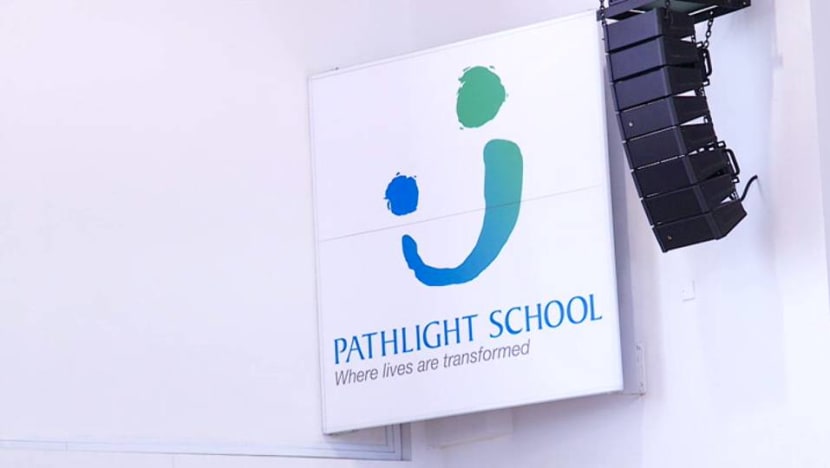MOE prepared to work with social service agencies to explore new models for special education schools
A new model for special education schools must deliver better outcomes for children and their families, says Education Minister Chan Chun Sing.

Pathlight School logo.
SINGAPORE: The Ministry of Education (MOE) is prepared to work with social service agencies and the community to explore different models for special education schools, said Minister for Education Chan Chun Sing on Tuesday (Sep 14).
He was responding to a question from Nominated Member of Parliament Dr Shahira Abdullah about whether the authorities would consider having all special education school teachers come under the ministry so that they can receive the benefits of being an MOE teacher.
There are currently 22 special education (SPED) schools led by 12 social service agencies.
While full funding is provided for SPED schools, the social service agencies have autonomy in matters such as the hiring of staff. SPED teachers are currently not directly employed by the Education Ministry but some teachers may be seconded from the ministry to the schools.
“I’m prepared to work with my staff, the SSAs (social service agencies) and the community to explore different and new models. But I would set up five conditions for us to consider as to whether a new model is better and more appropriate,” said Mr Chan.
The new model must deliver better outcomes for children and better support their families, he said as he laid out the five conditions.
The model must also provide better training opportunities and professional development for SPED teachers, said Mr Chan.
If implemented, the new model must be able to “engage the community to participate and partake in the endeavour”, and allow for a better continuum of care and support from pre-school, to school, to a post-school environment, he said.
“So we’re prepared to explore new models with the SSAs and the community so long as we bear in mind these five criteria that I’ve just laid out, and I’ll be happy to have these conversations with the SSAs and our community partners on how we can take the SPED sector forward as part of our Forward Singapore exercise,” said the Education Minister.
ATTRACTING AND RETAINING TALENT
Mr Chan also noted that MOE has been working with special education schools to put in place progressive HR frameworks to support teacher retention and career development.
This includes increasing the number of key personnel positions in special education schools, to provide good-performing SPED teachers with opportunities to advance their careers, he added.
To support this, SPED schools will receive additional funding for manpower costs in two tranches - one was rolled out in 2021 and the next one is planned for 2024, said Mr Chan.
“To receive the second funding tranche, SPED schools will need to implement more progressive HR practices and the corresponding increases in SPED teacher salaries,” he added.
“SPED schools will determine the salary adjustments for their teachers at different levels based on performance and current salary structures.”
MOE launched the Journeys of Excellence Package in 2020 with the aim of strengthening professionalism in SPED, said the Education Minister.
The package also recognises the years of experience and service of many SPED educators by “placing them at appropriate competency levels” and raising the job size of senior SPED teachers to “more closely align” to those of equivalent MOE teachers, he added.
PLANNING FORWARD FOR SPED NEEDS
Together with the Ministry of Social and Family Development (MSF), MOE plans to increase the number of SPED schools, said Mr Chan in response to a supplementary question from MP Carrie Tan (PAP-Nee Soon).
“In planning for a SPED school, the manpower needs are not as straightforward as a conventional school, because in a conventional school, the needs are perhaps more homogenous,” he added.
But in a SPED school, different children have different types of needs of differing severities, he noted.
“We do have certain planning ratios, but we certainly will need and would like to recruit more Singaporeans to join the SPED sector. Today, we do rely quite a bit on some foreign manpower,” said the Education Minister.
Stressing that working with children who need SPED support is emotionally demanding, Mr Chan said: “It’s not easy. I have given guidance to my staff that we cannot just plan on the basis of how many staff we need for how many children. We need to have a bit of a buffer … for us to be able to roster our people to go for training and also sometimes for them to take a break.”
MOE and MSF are also working closely with “the most difficult challenge”, which is the continuum of care from pre-school, to school to post-school, or care and work arrangements for the SPED community after they turn 18, said Mr Chan.
The Government can make plans based on the data on children who ended SPED as they emerge in pre-school, he added.
This means MOE should be able to plan for what they may need after they turn 18 and leave the school system, said Mr Chan. “And we really want to do this much better,” he added.
“Our current gap, the biggest gap in my view, is not so much the pre-school and the school system, which we have invested a lot of effort over the years, we can still do better,” said the Education Minister.
“Our next lap, the biggest gap will be how we provide the continuum from the school system to the post-18-year-old arrangement so that we can better support the SPED community, including the caregivers who will always be worried about what will happen to their special needs children when they are no longer around.”
















